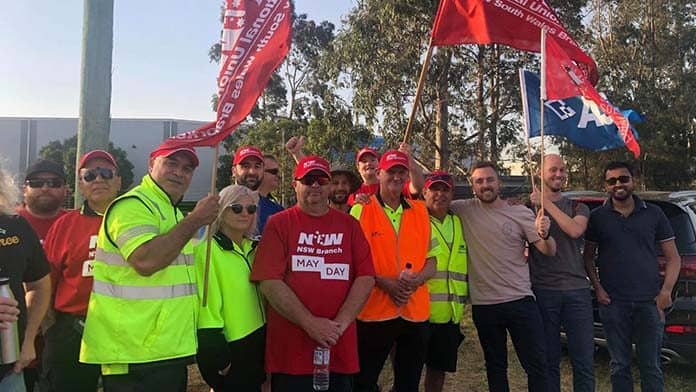Woolworths’ warehouse workers from one of the biggest distribution sheds in Sydney went on strike for 24 hours last Friday to send a clear message to management.
Almost 1000 workers there are fighting for equality of pay, respect and fair redundancy packages in Enterprise Bargaining negotiations which have dragged on for months.
“We just want to get equality pay with all the other Woolies people that do similar workloads”, union delegate Matthew Mattaio told Solidarity.
Workers at the warehouse in Minchinbury, members of the newly formed United Workers Union (UWU), are paid 16 per cent less than their counterparts in Victoria. Yet as a UWU organiser pointed out, “Sydney has the third highest cost of living in the world.”
From midnight on Friday 9 November both permanent and casual workers formed a hard picket line outside the Minchinbury warehouse, stopping all delivery trucks from entering.
Matthew explained that, “The company has forced us to come out on strike today for not negotiating what we have asked for.” He said, “What they offer is not even coming close to what we deserve.” Workers at the warehouse were forced to take a pay cut a few years ago due to the failure of Masters, another subsidiary of Woolworths Group.
Now they want a 16 per cent pay increase next year and 6 per cent a year for the two years following. Management first offered 3 per cent a year with a $2000 cash bonus up front. To put this in context, Woolworths Group management has recently received a 30 per cent pay increase.
“Management then came back to us and offered 3.75 per cent, 3.5 per cent, 3.5 per cent pay increases over the three year period with no cash bonus”, worker and UWU delegate Grant Doyle said. “which is actually lower than the previous offer they made” he added.
Workers are also fighting for higher redundancy entitlements and more controls on the use of casual workers. “There’s 400 plus casuals, they all do 40 hours plus and a lot of them have been here longer than five years”, Grant said. The union wants casual workers to be covered by the enterprise agreement, rather than being treated separately because they are employed through a casuals agency rather than directly by Woolworths.
An overwhelming majority voted to strike after it became clear that management was not going to consider budging.
There are also other important issues. Workers complain of being bullied and treated as “second class” by management, with one incident leading to an illegal walk-off-the-job a few months ago. This came after a manager initiated a physical altercation after a worker did not have their hi-vis vest done up, a condition that is not written into contracts.
“Management here is different to what we’ve had in the past. They don’t listen at all,” Matthew Mattaio said. Management’s attitude was on display during the strike with a large mobile surveillance camera set up in close proximity to the picket line.
Workers were planning indefinite strike action if Woolies does not budge. “89 per cent of people who did the ballot ticked the box for indefinite action,” he added, “that sends a really strong message that we mean business.” With 95 per cent of workers in the union, an indefinite strike would be a major blow for the company. Matthew added, “We’ve taken this stance today and we’re going to take more”.
By Jess Whittall






